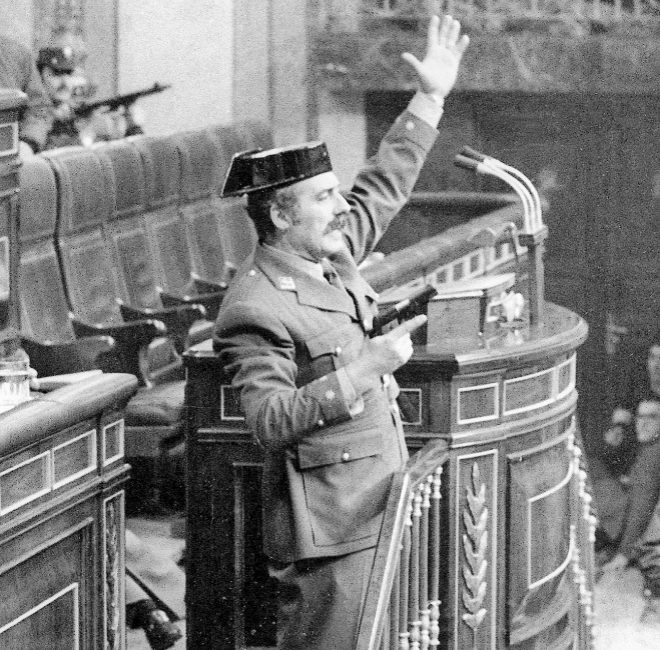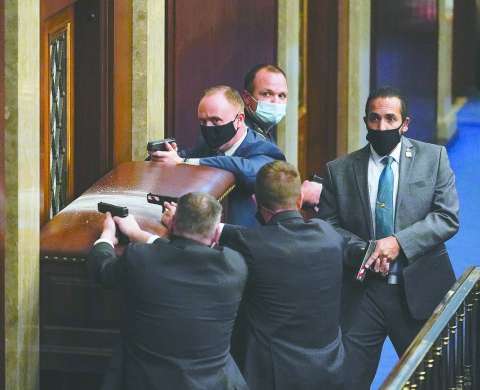On February 23, 1981, the Congress of Deputies, the lower house of the Parliament of Spain, was meeting to elect a prime minister. Their deliberations were rudely and violently interrupted when Lieutenant Colonel Antonio Tejero led 200 armed Civil Guard officers into the Deputies’ chamber, firing their service weapons up toward the ceiling. (The Civil Guard is the national police force of Spain which possesses a military capability to keep order should the need arise.) They took the legislators hostage. It was the centerpiece of a coup attempt to overthrow Spain’s then new, fragile democracy and restore the authoritarian rule Spain suffered under the late Francisco Franco from 1936 to 1975. What became known to history as 23-F for the date of the action, or the Tejerazo for its leader, failed thanks to the majority of the people and the military and police of Spain wanting democracy, and the courageous and decisive statement make by King Juan Carlos I denouncing the coup. Tejero and his collaborators surrendered to police, were arrested, tried, stripped of rank, and jailed.
January 6, 2021 was the United States’ Tejerazo moment. Both the similarities and differences between 23-F and Wednesday’s events at the U.S. Capitol demonstrate this. First, the similarities. Both national legislative bodies were in the process of the formal election of a national leader when a group interrupted a constitutional proceeding through force, and sought to impose a leader through illegal and unconstitutional means. The action met with opposition from the majority of citizens and media outlets in both countries. The differences are important too. Spain’s legitimate constitutional government was the target of an attempted coup by units of Spain’s national police and military, backed by authoritarian conservatives. Donald Trump and his Republican Party collaborators in Congress and a spectrum of Trump’s supporters on the streets of Washington attempted an autogolpe. An autogolpe is when a democratically elected, constitutionally legitimate leader attempts to retain power through unconstitutional means, including force. Like all autoglopes in modern history, dating to French President Charles Louis Napoleon Bonaparte’s seizure of power in 1851, the attack on democratic, constitutional government was led from the executive branch by the head of state. Fortunately for us, unlike Spain, the entirety of the United States’ military and its local and national security services did not collaborate with Trump’s autogolpe. They stood up for the Constitution and protected Congress from Trump’s attack.
The relevance for U.S. Catholics is the disturbing parallel between Catholics in Spain who supported the Tejerazo and other legacies of Franco’s authoritarian state, and U.S. Catholics who campaign to keep Trump as president at all costs through their support of his autogolpe. Again, consider the parallels. Spanish Catholic supporters of Francoist authoritarianism see such a regime as a bulwark against the anarchy, chaos, and anti-Catholic persecution at the hands of their opponents on the left. Many of Trump’s Catholic supporters make a similar claim. The latter group have developed a Manichean view of politics, where they see their cause as a fight against evil. (Recent months have seen a Gnostic politics arise among some of those same Trump supporters which emerged from that Manicheanism. Those persons claim they are privy to special knowledge proving the 2020 presidential election was stolen from Trump, which somehow lies beyond the reach of the education and ethics of state legislators, secretaries of state, governors, state and Federal judges, and the military and security services of our country. Those same Trump supporters denounce the politicians and judiciary leaders who heard and rejected their claims as corrupt. These accusations are made without evidence other than Trump supporters did not get their way with them.)
During his 36 years of rule, a personality cult grew around Franco as Spain’s indispensable man who stood for paz y orden. A personality cult has also grown around Trump to the point that Catholic supporters see him as their indispensable man for law and order. They take great offence at any criticism of Trump, as if one insulted their grandmother or Jesus Christ himself. Catholic support for Trump shares an ideological link to a view held by some U.S. Catholic conservatives in the 1950s, who saw Franco as a good, effective, and morally benign Catholic dictator who resisted the growing immorality of the modern era. Catholics here view Trump, despite his personal immorality, as a force for law and order, and against the legal sanction of individual behaviors Catholic moral teaching deems immoral. Other binding Catholic Church teachings, such as its Social Teaching are deprioritized or ignored. Here “prudential judgement” has become their cover to ignore and dissent against social teaching. As a matter of fact, they are practicing, as St. John Henry Newman put it, individual acts of willfulness, dissenting from the Church.
Both groups abuse the history of their respective countries. Spanish Francoists point to the very real chaos, anti-Catholic violence, and anarchy of the Second Spanish Republic of 1931 to 1939 as the main justification for their holding paz y orden above all. This view is problematic on at least two counts. Casual observers of Spain view mid-20th century Spain as a contest between an anti-clerical chaotic republic and an ordered, Catholic, monarchist kingdom. However, my own Basque family and their neighbors reveal the falsehood of that dichotomy. They and their fellow Basques were devout Catholics who were republicans, and rejected the radicalism found elsewhere in the Second Republic. Those same Catholics suffered oppression, torture, and death for 36 years under Franco’s regime, one that proclaimed itself the protector of the Catholic Church and its faithful. In addition, while Franco’s Spain publicly proclaimed obedience to the Catholic Church and its teachings, that regime systematically imprisoned and murdered their political opponents. According to Amnesty International the killing fields of Spain are exceeded only by those of Cambodia. Francoist Spain also created an idealized myth of Spain centered on cultural and Catholic religious elements originating in Castile, Aragon, and Andalusia, thus ignoring the greater diversity brought to that same culture and Catholic faith by Galicians, Asturians, Basques, and Catalans, among others. Trump and his supporters have not murdered their political opponents, though their possession of weapons in protests at state capitols is a constant and dangerous temptation for them, but they do present their own idealized vision of America defined by ideologically captive types of evangelical Christianity, overbearing masculine behaviors not befitting refined gentlemen, whiteness, and a nationalism which glorifies the United States at the expense of other nations. They caricature their opponents as “the Left” whose patriotism is suspect. This last critique is meaningless because political philosophy reveals great differences between liberalism, social democrats and other varieties of socialism, and communism. In the eyes of too many Trump supporters, people who advocate for the common good, believe human beings have a positive right to basic human needs, and that the state should provide, or assist in providing for those needs, are caricatured as “the Left,” whose identity as authentic Americans is suspect. They ignore the fact that American history is replete with movements and social experiments, inside and outside of government, which our Constitution would classify as attempts to, “provide for the general welfare” which helps us “secure the blessings of liberty for ourselves and our posterity.”
History demonstrates that when Catholics rely on the coercive power of the state to achieve their ends, as they have attempted in Spain, they fail in their goal and wind up discrediting the Catholic Church and its teaching in the process. Consider the fact that Spain has a more diverse political spectrum now than under the Second Republic, one that casual observers thought Franco successfully suppressed and eliminated. Today, the Church is viewed by many Spaniards with suspicion, due to its historic association with Franco. (The exception is the Church in the Basque country, which as we have seen stood with the people and suffered with them under Franco.) The Church in Latin America met a similar fate when the Church cooperated with dictators there to maintain and enforce their preferred vision of a social order. I hasten to add that this observation applies to Catholic support of left-wing authoritarian regimes, too. U.S. Catholics who support Trump’s autogolpe today are making a similar mistake, causing similar harm to the Church by giving justification to critics who believe that the Church is not about truth, but control.
We should hope that the United States can move forward from our Tejerazo as Spain did theirs. 23-F was a catalyst for all Spaniards to fight for democracy, which helped lay the foundation for a national consensus that yielded the most politically stable and economically prosperous period in that nation’s history. For ourselves, these times demonstrate that John Courtney Murray was prophetic in his warning in We Hold These Truths that the loss of our philosophical consensus as a country beginning in the 1960s would yield national disunity and social barbarism over time. We are witnessing that disunity and barbarism now. We can move forward like Spain did and find a new consensus for living together and talking together as one country and resolve our differences constructively and democratically. We have no choice. Like those brave Spanish legislators, people, and their king who faced down Tejero’s guns, none of us want to budge. Nor should we. For U.S. Catholics, it is past time to stop imitating and amplifying our national differences with our Church, and resource the entirety of our theological and philosophical thought to provide compelling and just political and social ways forward for our country.


Photo Credit: Jacksonville Journal-Courier


